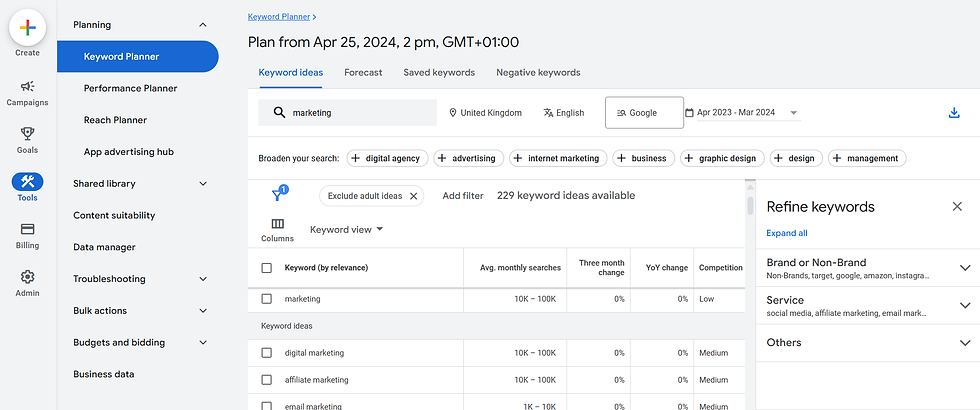5 SEO Tips for Small Businesses
- SME CofE

- Apr 30, 2024
- 3 min read
Getting recognition and website traffic for a small business can be a difficult process - but not impossible! If you’re like most businesses, your number one goal is to bring in new customers, that means finding the people or businesses looking for your product or service. This can be a difficult process for small businesses but with these 5 SEO tips will make the process a whole lot easier.
Search engine optimization (SEO) is the process of optimising your website to improve its visibility and ranking on search engines. The goal is to improve organic traffic to your website, making it more likely that potential customers will find your business. It is the most cost effective means of marketing and involves the use of key words, web page analysis and internal & external links.
So how can you as a small business utilise SEO? Well these 5 tips will make it second nature.
Keyword Research
Effective keyword research is the cornerstone of any successful SEO strategy. Begin by brainstorming a list of keywords relevant to your business, products, services, and overall niche. Utilise keyword research tools like Google Keyword Planner, SEMrush, or Ahrefs to identify high-volume and low-competition keywords, as well as looking for long-tail keywords that are specific to your niche and have less competition. Prioritise keywords based on relevance, search volume, and competitiveness. Finally, strategically incorporate these keywords into your website's content, including headings, paragraphs, meta tags, and URLs. Please also remember to make these keywords and phrases flow properly for your readers - don't just dump key words in for the sake of it !
Optimise On-Page Elements
This next tip is a SEO strategy similar to utilising keywords but instead of focusing on the words people read it focuses on the unseen elements of the website. On-page optimisation involves optimising various elements of your website to improve its search engine visibility. To achieve this craft unique and descriptive title tags for each page, incorporating target keywords. Write persuasive meta descriptions that summarize the content of each page and include relevant keywords. Structure your content with clear heading tags (H1, H2, H3, etc.) to enhance readability and search engine comprehension. Create SEO-friendly URLs that accurately describe the content of the page and include target keywords.
High-Quality Content
Content quality is a major factor for SEO success. Make sure to focus on creating valuable, informative, and engaging content that resonates with your target audience. Conduct research and provide unique insights, tips, or solutions to differentiate your content from competitors. Utilise various formats, such as blog posts, videos, infographics, or podcasts, to cater to different preferences. Regularly updating your content ensures its relevance and maintains your website's authority in your industry.
Mobile Optimisation
With the rise of mobile usage, optimising your website for mobile devices is essential. Choose a responsive website design that adapts seamlessly to different screen sizes and resolutions. Website building platforms such as WordPress and WIX allow you to view mobile view while designing your website to ensure that the contents look good in both views. Prioritise mobile page speed by optimising images, minifying CSS and JavaScript files, and leveraging browser caching. Ensure all interactive elements are easy to tap and navigate on touchscreen devices, enhancing the overall user experience - no tiny unclickable buttons !
Local SEO
Our final tip is by far one of the best SEO strategies for small businesses that operate within a specific area or any businesses that are not 100% online based, this is Local SEO which is a crucial SEO for small businesses who want to target specific geographic areas. Start by optimising your website for local search by claiming your Google My Business listing to put you on the map for locals to find. Make sure to provide accurate business information, including the name, address, contact details and business hours. Furthermore, incorporating location-based keywords into your content can signal relevance to local search queries. Encourage satisfied customer to leave positive reviews, boosting your local credibility and visibility.
How can SME Centre of Excellence help your businesses SEO?
Here at SME Centre of Excellence our organisation help businesses start survive and thrive and have a dedicated marketing team to help you with all the marketing you need from building SEO and website design to content and email marketing we cover the entire digital landscaping. If you want help developing your SEO and getting your website ranked higher on google search or want help with marketing then contact us today for a FREE audit. hello@smecofe.com.







Insightful ! For brands trying to stay ahead of SEO changes, working with a trusted seo agency leeds like Path Seekers can ensure compliance, optimization, and sustained growth.